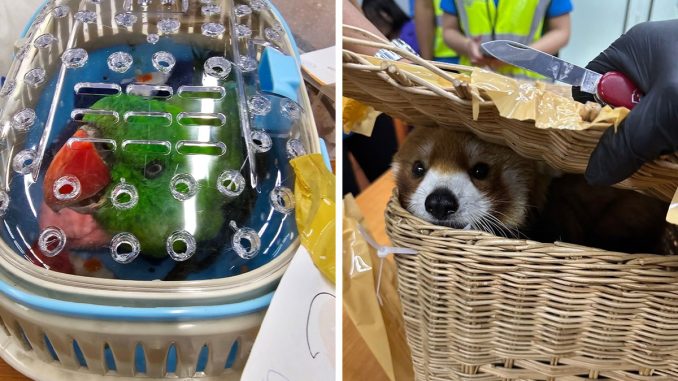
Six Indian nationals were arrested at Bangkok’s Suvarnabhumi Airport on Wednesday (March 6) after a red panda and dozens of other exotic animals and birds were seized from their checked luggage in a major wildlife trafficking bust.
“We have found out that the animals include 29 black throat monitor lizards, 21 snakes, 15 birds, including parrots — a total of 87 animals. The animals were hidden inside the luggage,” Thailand’s Customs Department announced in a statement.
Among them were one tigerfish, two red-eyed squirrels, a frog, two bats, cotton-top tamarins, and dozens of chameleons.
Six Indian nationals were arrested at Bangkok’s Suvarnabhumi Airport on Wednesday (March 6) after trying to smuggle 87 live animals
Image credits: Thailand Customs
The Kingdom is a major transit hub for smugglers in the illegal wildlife trafficking trade, who often sell the animals in China and Vietnam. Although recent years have seen a surge in wildlife trafficking to India, CBS reported.
The suspects face a maximum of 10 years in jail or four times the amount of import duties.
The endangered red panda can be seen peeking out of a wicker basket in photos released by the department. Only 10,000 of the Asian mammals are left in the world, according to the World Wildlife Fund (WWF).
“We have found out that the animals include 29 black throat monitor lizards, 21 snakes, 15 birds,” Thailand’s Customs Department announced in a statement
Image credits: Thailand Customs
The suspects face a maximum of 10 years in jail or four times the amount of import duties
Image credits: Thailand Customs
In a separate picture, a parrot appears shut in a plastic container with air holes drilled in the lid to let it breathe.
Meanwhile, snakes were coiled together in cloth bags, and lizards were kept in what seemed like plastic tubs.
Just last month, a Mongolian man was arrested at the same airport after a failed attempt to smuggle Komodo dragons, pythons, and two dozen live fish out of the Kingdom.
The Kingdom is a major transit hub for smugglers in the illegal wildlife trafficking trade
Image credits: Thailand Customs
Snakes were coiled together in cloth bags
Image credits: Thailand Customs
All animals found are protected under a multilateral treaty called CITES for the protection and conservation of endangered animals and plants from illegal smuggling.
The international agreement, signed in Washington, D.C., by 184 parties in 1973, is designed to ensure that international trade in specimens of wild animals and plants does not threaten the survival of species.
Thailand has also launched a dedicated Wildlife Crime Intelligence Unit last year to prevent wildlife trafficking across its borders.
A parrot appears shut in a plastic container with air holes drilled in the lid to let it breathe
Image credits: Thailand Customs
Meanwhile, lizards were kept in what seemed like plastic tubs
Image credits: Thailand Customs
The lucrative trafficking of wildlife has become the 4th biggest illicit trade on the planet, worth an estimated $100 and $150 billion per year.
Trafficking wildlife, animal parts, and plants has far-reaching consequences, not only for the animals involved but also for human livelihoods and biodiversity.
Besides diminishing species populations, illegal wildlife trade can threaten ecosystem functions, as it can create sex-ratio imbalances and slow the reproduction rate of vulnerable species, the United Nations Office on Drugs and Crimes (UNODC) writes.
Additionally, the illicit practice can pose health threats to humans, especially if it introduces viruses, bacteria, or species to which native populations are not adequately resistant.
“I hope they were all put in prison,” someone wrote
The post Endangered Red Panda, Tigerfish, And Chameleons Seized From Smugglers In Thailand first appeared on Bored Panda.
